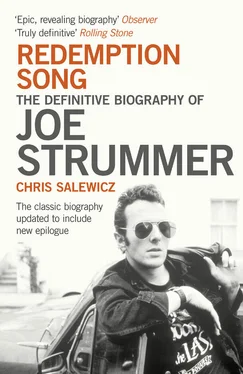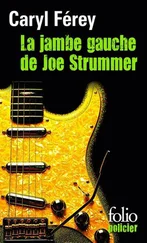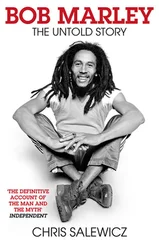Visitors would sometimes feel the house seemed run down – the diplomat and his wife, after all, had been used to servants and had lost the habit of home maintenance. Some improvements were made. French windows were installed, letting in far more light and a view of the disproportionately large garden and lovely apple orchard. The patio that separated the living-room and garden was extended. But little else was done to the home that would serve the Mellors for over two decades. Although slightly shabby, 15 Court Farm Road was an extremely comfortable house. But the sense of alienation in the area was reflected inside it. ‘I think Ron and Anna lived this very weird, isolated life,’ Gerry King remembered of a visit there in the late 1960s. ‘You could imagine them in the times of the Raj, as though he had been posted to some obscure place in India, and they are there, sipping their sherry, and going on to whisky. That sort of thing: a feeling of not being real. But there was something very wonderful and lovely about them both. And Uncle Ron also had that gentleness. I felt that he didn’t cope with reality well. But he was a lovely man.’ Yet Ron and Anna’s loneliness was not surprising: like their sons, Ron and Anna had suffered disappearing diplomatic service relationships, and had few friends in London.
Living at 54 Oakley Road, some 500 yards from 15 Court Farm Road, was the Evans family. Richard, the youngest child, was a few months younger than David Mellor and a year older than Johnny Mellor. Soon after the Mellor family had moved into their new home, the Evans and Mellors met up – he too attended Whyteleafe primary school. ‘It’s just a village primary at the bottom of the hill. That’s where I went. That must’ve been where we met.’ The two families became close; Richard quickly came to regard David Mellor as his best friend. ‘It was Johnny-and-David, a kind of Scottish thing. “Johnny” – that’s what his mother always called him. David is nine, I’m nine. He’s very quiet, very withdrawn, but there’s something very comfortable about being with him. And I would literally sit there with him not saying anything for half an hour and it was OK, you didn’t have to. He was my mate, my best mate. But all three of us played together.’
Hardly a day would go by when Richard Evans was not over at the Mellor house: ‘My recollection of it was that I was always there and it was always a very warm house. They never locked it up. The door was always open. My parents were really security conscious: our house had been burgled. But Anna was not, the house was always open, they never locked the door. Yet they never got turned over. Maybe it was just the atmosphere of the place. But it was always an open house.’
Anna’s engaging and welcoming personality meant that Richard very quickly grew close to her (‘hugely’), and she took on the role of a surrogate aunt. ‘I was closer to her than I was to my own mother, emotionally. It was Anna I spoke to about my issues, my successes and failures. No disrespect to my mum, who was hugely strong in other ways, but it was Anna who was the emotional pillow or rock or whatever. She was tiny, not more than about five feet one, but one of those people who is physically diminutive but whose heart is huge. She was very quiet, and whenever you went there there was always a cup of tea or sandwiches. She’d be fussing around, making you feel comfortable, and would have just made a cake or whatever. She was constantly caring for you. I’m absolutely sure – and it was one of the great joys of Joe – that he had his mother’s huge generosity.’
As he grew into his late teenage years, Johnny Mellor and his father were in increasing conflict, as they played out a classic scenario of a son wanting to escape from his father to find his own course in life. To Iain Gillies Johnny once glumly described Ron Mellor as being like ‘an old bear in a bad mood’. Richard Evans agreed: ‘Like a bear. Sometimes quite angry. You walked around him and weren’t quite sure how it was going to be. If he was purring, it was OK, you could have a really good time with him. But if he was growling you just got the hell out of there. I think Joe and David were wary of him too. There was a weird juxtaposition between the soft, downy-faced mother, with really soft skin, and the dad. I think that’s how they got along.’
As Johnny Mellor grew into Joe Strummer, he displayed considerable behavioural similarities to his father, rendering the earlier conflict between them even more archetypal. ‘Joe and I had this big gap from around the time of the Clash until the last three years of his life, one of about twenty years,’ said Richard. ‘The first thing I noticed when I saw Joe as a grown man was, “Fuck, he’s got his dad’s eyes.” His dad’s eyes were always quite wild and quite irritated-looking, quite red, as though he needed to have an eye-bath. The eyelids were almost separated from the eyeball. Joe’s were the same. It was bizarre, because I looked at Joe as a 47-year-old man, and I went straight back to his dad. His dad was wild-eyed and erratic.
‘Joe’s dad was very critical. God knows why he was in the diplomatic corps. [Joe’s ex-partner, Gaby Salter, says that she once heard a story that Ron was being assessed for suitability as a spy but was prevented from doing so because of Anna’s drinking.] He’d rant about inequality. There’s something in there that didn’t add up – as a child I was wary of him. He was a diplomat, but not diplomatic. He was passionate, full of conviction: he was a socialist. That’s Joe’s political aspect – came from his dad. Somehow that doesn’t fit. If you looked at the man, this was not a sharp-suited, smooth-talking diplomat. He was passionate and volatile. He was also exciting – there was an attraction to the man. You can see what that was for Anna: the international lifestyle, but also that the man was mysterious. It could be beautiful or it could be harmful.
‘There was a huge positiveness about Joe, an energy, that everybody liked. I found myself more and more attracted away from David towards Joe, his younger brother. Being a year younger is an issue as a nine-year-old. But I felt drawn towards Joe, as everybody did. He was just a good person, he had a wonderful capacity to just make you feel better about everything. If he had a good idea – “Let’s do this or that” – somehow he turned it into your idea. He’d be the one saying, “Great idea, I wish I’d thought about that.” You’re going, “Did I think of it? Oh, brilliant.” He had that huge ability to make people feel much better about themselves. It was remarkable: at eight years old he had that. It was nothing to do with the Clash: he just had that gift.’
It was a gift, however, that was about to be sorely tested, at the new school that Ron and Anna Mellor had chosen for their two sons, City of London Freemen’s School in Ashtead in Surrey, 20 miles to the south-west of Upper Warlingham.
The school had been founded in 1854 as the City of London Freemen’s Orphan School. In 1926 the Corporation of London moved the school into the country and it reopened in Ashtead Park in Surrey, a gorgeous estate of 57 acres of landscaped grounds, approached by an avenue of lime trees. You might feel that the idea of being sent to a school established to educate parentless children would have struck a sad chord within Johnny Mellor: he spoke later of how he felt abandoned by Ron and Anna when he was sent to CLFS as a boarding pupil, their solution to the dilemma of how the overseas postings were affecting the boys’ education. After the light discipline at Whyteleafe, CLFS would prove traumatic for both the Mellor boys; Johnny Mellor would never sufficiently come to terms with having been sent away to boarding school by his parents for him to forgive them for the wounding created by this apparent desertion in his childhood. So great had been that hurt that, according to Gaby Salter, Joe’s long-term partner for fifteen years, he was still berating his mother over being sent to CLFS as she lay dying in a cancer hospice twenty-five years later. Part of him felt that his entire life would have been different if he had not been sent there – though that experience was a formative one for the person he was eventually to become.
Читать дальше












